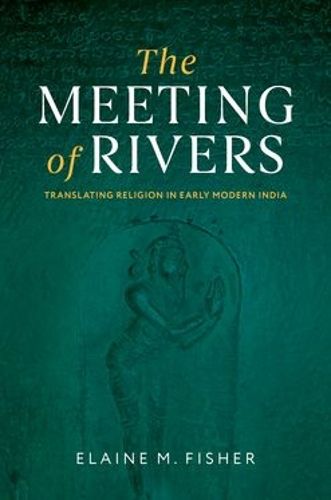Readings Newsletter
Become a Readings Member to make your shopping experience even easier.
Sign in or sign up for free!
You’re not far away from qualifying for FREE standard shipping within Australia
You’ve qualified for FREE standard shipping within Australia
The cart is loading…






The Meeting of Rivers reconstructs the prehistory of India's newest religion, Virasaivism (or Lingayatism) from its own voices, drawing on unstudied and unpublished archival sources in several south Indian languages. By radically reframing our understanding of the origins of Virasaivism, Elaine Fisher provides a counterpoint to inherited models of both Hindu devotional traditions as well as the history of vernacularization in South Asia.
According to conventional wisdom, Virasaivism was a strictly monolingual, vernacular devotional (bhakti) movement, restricted to the Kannada language, born in the twelfth century as a social protest against caste and the retrogressive Sanskrit language. The voice of the archive, however, tells a different story--Virasaivism was a multilingual religion from its inception. Its rejection of caste never entailed the rejection of Sanskrit; rather, its Sanskrit inheritance is pivotal to understanding the tradition's enduring legacy of anti-caste sentiment. By questioning the historical relationship between caste, religion, and language, this monograph highlights the contributions of premodern voices from diverse non-brahmana castes to India's religious history.
Simultaneously, The Meeting of Rivers articulates a new conceptual vocabulary for speaking in comparative theoretical terms about multilingualism and translation. It proposes a shift from a unidirectional model of vernacularization in South Asia in favor of a horizontal model of multilingual exchange in which religious content and subjectivities were shaped by multidirectional flows. As such flows traversed cultural zones across India's linguascape, local Virasaivisms--in the plural--were "translated" into being, irreducible to a singular monolingual social revolution.
$9.00 standard shipping within Australia
FREE standard shipping within Australia for orders over $100.00
Express & International shipping calculated at checkout
The Meeting of Rivers reconstructs the prehistory of India's newest religion, Virasaivism (or Lingayatism) from its own voices, drawing on unstudied and unpublished archival sources in several south Indian languages. By radically reframing our understanding of the origins of Virasaivism, Elaine Fisher provides a counterpoint to inherited models of both Hindu devotional traditions as well as the history of vernacularization in South Asia.
According to conventional wisdom, Virasaivism was a strictly monolingual, vernacular devotional (bhakti) movement, restricted to the Kannada language, born in the twelfth century as a social protest against caste and the retrogressive Sanskrit language. The voice of the archive, however, tells a different story--Virasaivism was a multilingual religion from its inception. Its rejection of caste never entailed the rejection of Sanskrit; rather, its Sanskrit inheritance is pivotal to understanding the tradition's enduring legacy of anti-caste sentiment. By questioning the historical relationship between caste, religion, and language, this monograph highlights the contributions of premodern voices from diverse non-brahmana castes to India's religious history.
Simultaneously, The Meeting of Rivers articulates a new conceptual vocabulary for speaking in comparative theoretical terms about multilingualism and translation. It proposes a shift from a unidirectional model of vernacularization in South Asia in favor of a horizontal model of multilingual exchange in which religious content and subjectivities were shaped by multidirectional flows. As such flows traversed cultural zones across India's linguascape, local Virasaivisms--in the plural--were "translated" into being, irreducible to a singular monolingual social revolution.